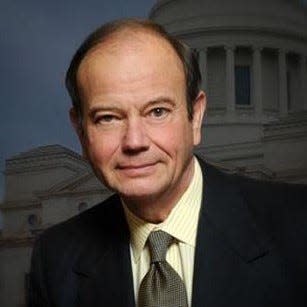An extraordinary political season| Steve Barnes

So conservative had become the Arkansas General Assembly that practically no one spent any serious time wondering if anything or anyone could push it farther to the right. During much of his tenure, Gov. Hutchinson, never confused for a liberal until the Age of Trump, did what he could to push his Republican Party’s legislative delegations toward the center. He made known his preferences for more moderate GOP candidates, openly (and unsuccessfully) backing an east Arkansas incumbent whose Senate record was in sharp contrast to what the eventual winner promised (and more or less delivered).
Near-identical ideological matchups characterize next week’s Republican primaries, which are further flavored by a near-unprecedented number of open seats – nine – due to retirements, term limits or ambition for other offices (lieutenant governor, treasurer) and a smaller number of intra-party challenges. Not new, but noteworthy: The demise of the Reagan-era “Eleventh Commandment” that “Thou shall not speak ill of a fellow Republican.” Not a few rivals openly despise one another. With the most important statewide races – governor, U.S. Senate – presumptively decided, the legislative campaigns have been the ones to watch.
And yet another element, which mirrors state and congressional primaries across the nation: A split between hard-right, culturally conservative populists and the old school, Main Street Republicans – the traditional GOP establishment.
The balance of power, measured by party affiliation, will change but little. Legislative redistricting gave the GOP an opening to expand its ranks in the 100-member lower chamber from its current, veto-proof 76. As for the 35-member Senate, Republicans can expect to add only one seat to their 27-seat majority, a pickup enabled by the departure of term-limited Larry Teague. The other Senate seats in Democratic hands are likely to remain so. For example, the Delta district that has been the retiring Sen. Keith Ingram’s turf – his native Crittenden County, plus Phillips and parts of Lee and St. Francis – will be claimed next Tuesday by veteran State Rep. Reginald Murdock.
When districts change, so can their demographics. Those shifts figure in several of the Senate primaries that have commanded the attention of the political class in Arkansas this season. An excellent example is the battle between two legislative incumbents, Sen. Mark Johnson of Little Rock and his challenger, Rep. Spencer Hawks of Conway. Johnson has benefitted from a predominantly rural constituency that redistricting has made decidedly more urban, as defined by the city of Conway – where his legendary father, Justice Jim Johnson, made his home, and where Hawks makes his. Johnson has the backing of former Gov. Huckabee, while Hawks has the Arkansas Chamber of Commerce in his corner. (The winner will face a Democratic nominee in November.)
A similar scenario presents to the north, where incumbent Bob Ballinger is defending his seat against the man from whom he took it four years ago, Bryan King. The two have absolutely no use for one another and don’t care who knows it. But there are three other candidates in the primary, including one of those chamber of commerce Republicans, Bob Largent, who is in fact an officer of the Harrison chamber. And, yes, redistricting looms as a major factor. Encompassing all of Madison and Carroll counties and portions of four adjoining counties, the new lines would seem to strongly favor King and Largent. Largent is, well, the “chamber” candidate, while King is backed by the arch-conservative Commerce in Action bloc. (There’s a longshot Democrat for the nominee to face come autumn.)
In White River country, there’s a race that pits cultural conservatism against conservative pragmatism. The latter is embodied by incumbent Sen. James Sturch, fending off a challenge by Rep. John Payton. The bulk of the district is Sturch’s native Independence County, and about a quarter of it is the soil of a third candidate.
In a district dominated by Fort Smith, State Rep. Justin Boyd would appear to hold a veteran’s advantage against Kelly Procter-Pierce, another of their party’s hard-right fiscal-social conservative wing. Incumbent Sen. Matt Pitsch eschewed a reelection bid to seek the state treasurer’s job. Just across the district line, meantime, Van Buren city councilman Jim Petty, an accountant, could claim an open seat anchored by Crawford County. His opponent is Warren Robertson of Alma, a former cop, now an insurance agent, and bedeviled by more than $400,000 in past state and federal tax liens.
A single member, especially in the Senate, can make an enormous difference given the General Assembly’s reliance on the committee system to evaluate legislation, to advance or bury it. With at least a quarter of the Senate membership about to change and a new governor due in January, this is a political season of greater than normal significance.
Steve Barnes is the host of "Arkansas Week" on Arkansas PBS.
This article originally appeared on Fort Smith Times Record: An extraordinary political season| Steve Barnes
